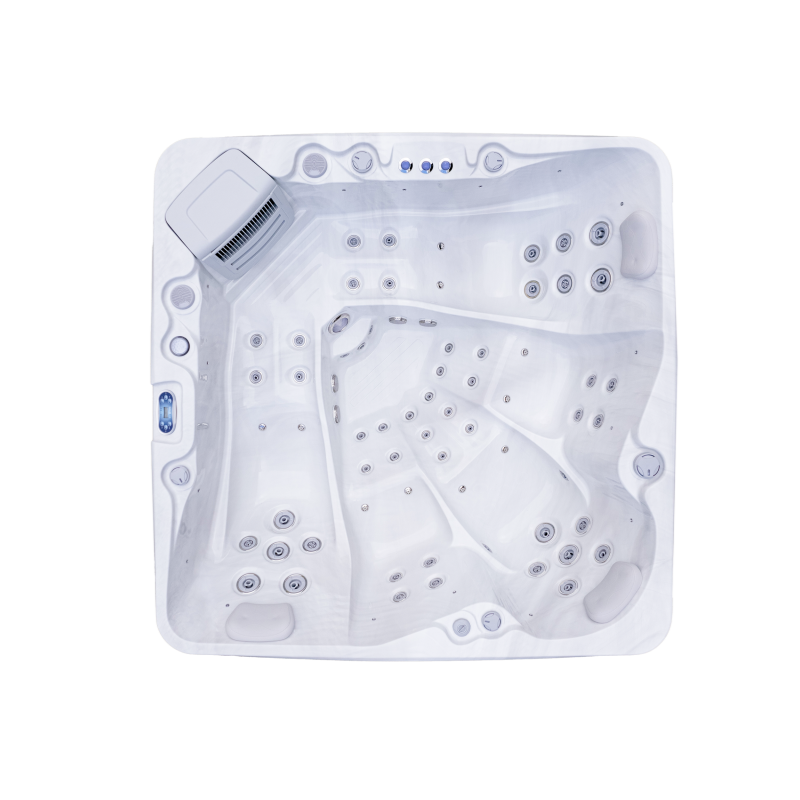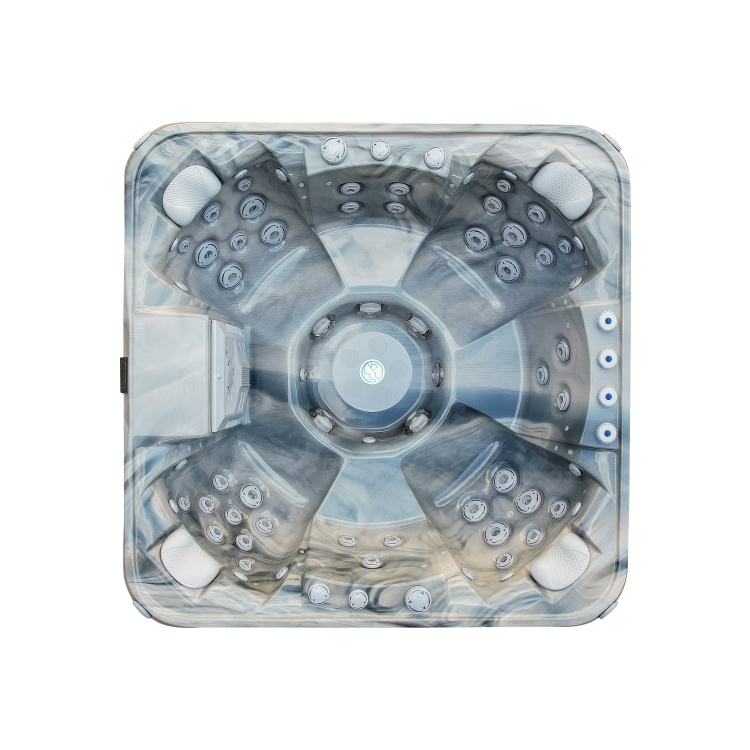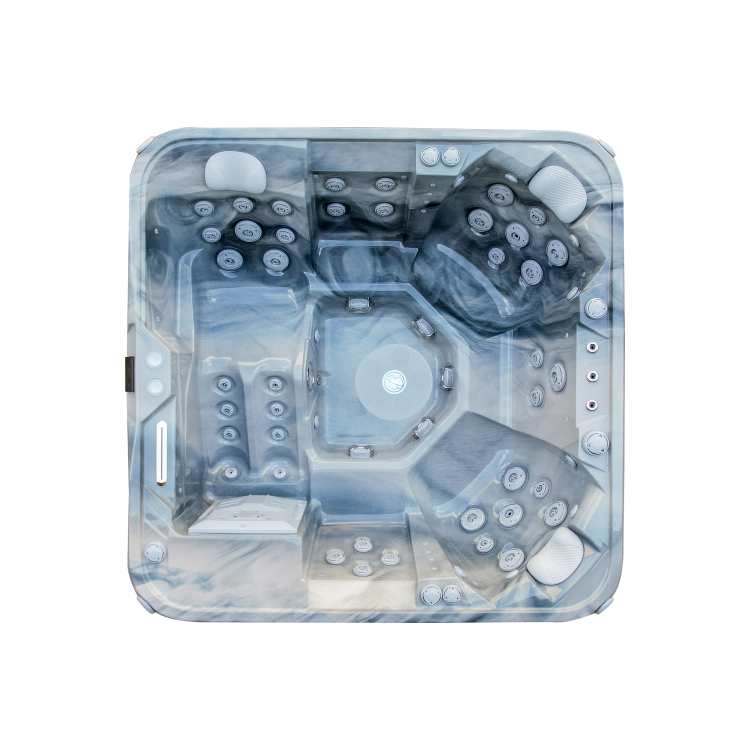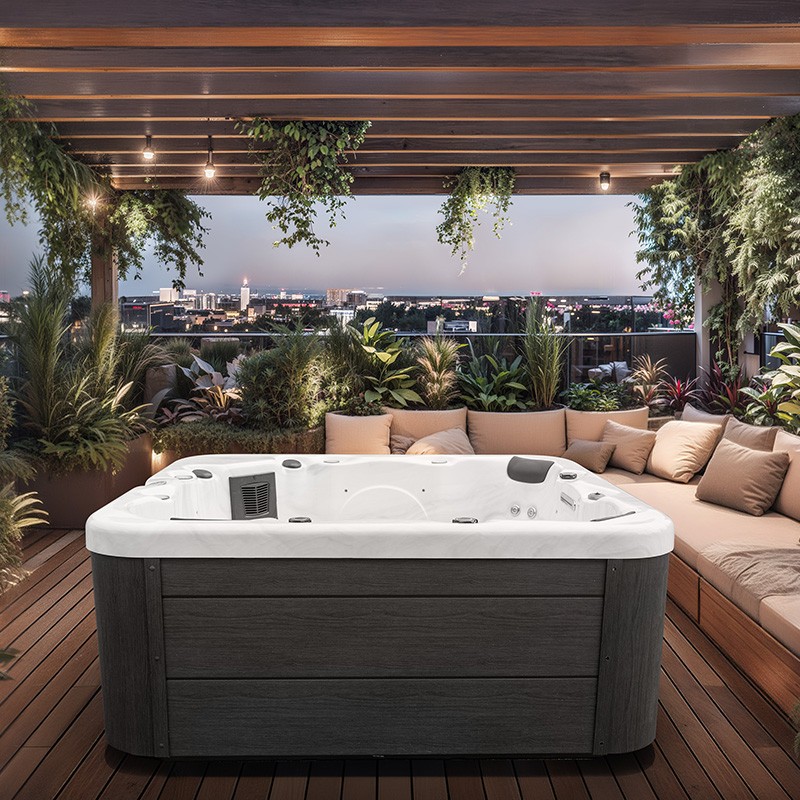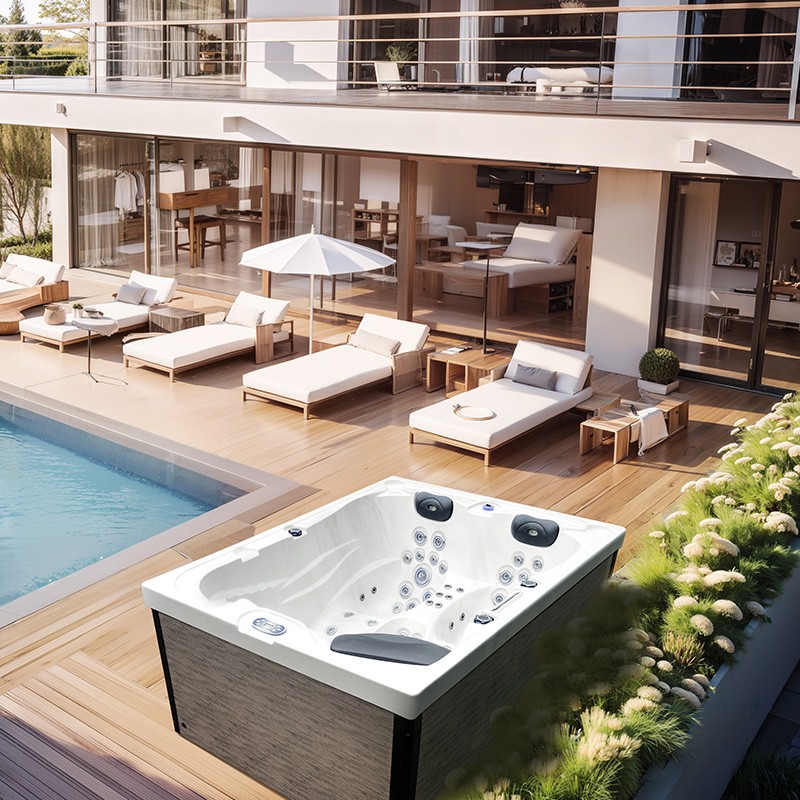Modern life is fast-paced and stressful, requiring both physical and mental relaxation. More and more people are choosing spa jacuzzi bathtubs or saunas to relieve fatigue, boost metabolism, and improve sleep.
However, a common question is: "Which is healthier, a spa jacuzzi bathtub or a sauna?"
This isn't just a matter of "preferring a bath to a sauna," but involves health factors such as bodily mechanisms, temperature stimulation, metabolic processes, and effects on the skin and cardiovascular system.
This article will delve into the health differences between spa jacuzzi bathtubs and saunas from multiple perspectives, helping you understand which is more suitable for you. Throughout the article, we will repeatedly discuss the principles, effects, and precautions of spa jacuzzi bathtubs to help readers scientifically choose the relaxation method that best suits them.
What is a spa jacuzzi bathtub? How does it work?
A spa jacuzzi bathtub (Hydrotherapy Jacuzzi or Spa Bathtub) is a bath therapy device that combines warm soaking, water jet massage, and bubble stimulation.
Through adjustable nozzles, a circulating water pump, and a constant temperature system, it allows water to flow at specific pressures and angles onto specific parts of the body (such as the back, waist, legs, and soles of the feet), thereby achieving the following:
• Relieving muscle tension and fatigue;
• Promoting blood circulation;
• Improving lymphatic flow and metabolism;
• Reducing joint stiffness or mild pain;
• Providing psychological relaxation and comfort.
Compared to a regular bathtub, the core of a spa jacuzzi bathtub lies in the dual effects of "dynamic water jet massage + constant temperature heat therapy." This combined therapy (Hydrotherapy) is commonly used in physical therapy and sports rehabilitation to relieve muscle soreness after exercise and promote recovery.
What is the principle behind a sauna? How does it affect the body?
Sauna, originating in Northern Europe, is a traditional relaxation method that uses a hot, dry environment to induce sweating and accelerate metabolism.
Typical dry sauna temperatures range from 70°C to 100°C with low humidity; while wet saunas (steam rooms) have lower temperatures (approximately 45°C-60°C) and higher humidity. Both achieve their effects by increasing body temperature and perspiration:
• Promoting pore opening and sweating;
• Improving blood circulation;
• Relieving joint pain;
• Releasing endorphins, resulting in a relaxing and pleasurable experience.
From a physiological perspective, sauna is a form of "thermal stress therapy," using short-term high-temperature stimulation to induce a self-regulating response in the body. Spa jacuzzi bathtubs, on the other hand, combine water pressure and heat to produce a gentler, more localized therapeutic effect.
What are the differences in the mechanisms by which spa jacuzzi bathtubs and saunas affect health?
While both spa and sauna bathtubs utilize heat as a core health mechanism, their pathways of influence differ significantly:
Contrast Dimensions | Spa Jacuzzi Bathtub | Sauna |
| Heat conduction method | Water medium heat transfer (moist heat) | Air medium heat transfer (dry heat) |
Temperature range | Approximately 36°C - 42°C | About 70°C - 100°C (dry steaming) |
| Strength of action | Gentle, controllable, localized | Intense, systemic |
| Main physiological effects | Water pressure + thermal stimulation + massage to promote blood and lymph circulation | High temperature induces sweating and blood vessel dilation, promoting metabolism and detoxification |
| Applicable people | Suitable for most people, including the elderly and those with mild cardiovascular or muscle fatigue | Not suitable for high blood pressure, heart disease, pregnant women, and the infirm |
| Comfort | Mild, comfortable, less irritating | Strong stimulation, some people are prone to dizziness or discomfort |
Conclusion:
A spa jacuzzi bathtub offers a gentle, stable, and continuous relaxation experience;
A sauna, on the other hand, is a short-term, high-temperature stimulation method that induces sweating.
Their health benefits differ, and the choice should be based on individual constitution and needs.
Can a spa jacuzzi bathtub "detoxify" like a sauna?
Many people believe that "the more you sweat, the more you detoxify," and therefore prefer saunas.
However, from a scientific perspective, this understanding is not entirely accurate.
1. The human body primarily detoxifies through the liver and kidneys, not the skin
Sweating does excrete small amounts of metabolic waste (such as urea, lactic acid, and trace amounts of salt), but the proportion is extremely low. The "detoxification" induced by saunas mainly involves a temporary increase in fluid circulation.
2. Although a spa jacuzzi bathtub does not induce excessive sweating, it can promote circulation and metabolism
The combination of water pressure and heat accelerates blood flow and improves lymphatic circulation, enabling the body to transport oxygen and metabolic waste more efficiently, indirectly aiding in "detoxification."
3. Safer for those with weak constitutions
The high temperatures of a sauna can cause significant fluctuations in blood pressure and a rapid increase in heart rate, while a spa jacuzzi bathtub offers lower temperatures and less stimulation, requiring less physical tolerance.
If the goal is to improve metabolism, promote circulation, and relieve fatigue, a spa jacuzzi bathtub can achieve similar "detoxification" effects, but more safely and gently.
Which is better for relaxation and stress relief: a spa jacuzzi bathtub or a sauna?
From a psychological and nervous system perspective:
The water massage of a spa jacuzzi bathtub directly stimulates nerve endings and muscle tissue, promoting the release of endorphins and bringing a sense of relaxation. The buoyancy of water also reduces the burden on the body, allowing muscles to relax.
Saunas stimulate the sympathetic nervous system with high temperatures, promoting post-stress relaxation. While this provides comfort, the intensity is high, and some people may experience discomfort upon first use.
Furthermore, spa jacuzzi bathtubs can be used for extended periods (generally 15-30 minutes), offering a more stable and lasting relaxation effect. The high-temperature environment of a sauna is not suitable for prolonged stays (generally 10-15 minutes), as the effects are more "burst-like."
Therefore, if you are seeking deep relaxation and a stable balance of mind and body, a spa jacuzzi bathtub is more ideal.
Which is better for blood circulation: a spa jacuzzi bathtub or a sauna?
Both promote blood circulation, but their mechanisms and safety differ.
The mechanism of action of saunas:
• Saunas use high temperatures to dilate blood vessels and increase heart rate, accelerating blood flow;
• However, the high-temperature stimulation is intense, placing a significant burden on the cardiovascular system;
• It is a beneficial stimulus for healthy adults, but may pose a higher risk to people with high blood pressure or heart disease.
Mechanism of Action of Spa Jacuzzi Bathtub:
• The buoyancy of water reduces resistance to venous return;
• Water flow massage directly promotes local circulation;
• Constant temperature hot water gently dilates blood vessels, improving overall microcirculation;
• Suitable for those who need improved circulation but cannot tolerate strong stimulation.
If the goal is to improve blood circulation without increasing the burden on the heart, the spa jacuzzi bathtub is healthier, safer, and more stable.
From a skin health perspective, which is more beneficial?
Spa Jacuzzi Bathtub:
• Warm water softens the stratum corneum, promoting skin cleansing;
• Water flow massage stimulates skin microcirculation, resulting in a healthier complexion;
• When combined with mineral salts or essential oils, it can moisturize, relax, and nourish;
• Low risk of skin barrier damage.
Sauna:
• The dry, hot environment can open pores in a short time, helping with perspiration;
• However, it also removes a large amount of moisture from the skin, easily causing dryness and flaking;
• Not suitable for dry or sensitive skin.
From a skin health perspective, spa jacuzzi bathtubs are gentler, promoting skin hydration and blood circulation, while saunas are more suitable for oily skin and those with a high metabolism.
How do the two differ in their effects on sleep and mood regulation?
Scientific research shows that temperature is closely related to nerve relaxation.
• Spa jacuzzi bathtub: Stimulates the parasympathetic nervous system through water flow and heat, putting the body into a "rest mode," which helps improve difficulty falling asleep and relieve anxiety.
• Sauna: Induces sleep indirectly through the "cooling reflex" after high temperatures, but the process is more intense and may cause dizziness, fatigue, or dehydration in some people.
Therefore, for those with chronic insomnia or nervous tension, spa jacuzzi bathtubs are recommended, as their effects are gentle and suitable for daily use.
Which method is more suitable for different body types and health conditions?
Crowd | Recommended choice | Reason |
| Hypertension/heart disease patients | Spa jacuzzi bathtub | Low temperature, low pressure, no increased burden on the heart |
| Elderly | Spa jacuzzi bathtub | Gentle relaxation, controllable time, buoyancy and pressure reduction |
| Athletes/Bodybuilders | Spa jacuzzi bathtub | Helps relieve muscle tension and recovery |
Oily skin / young men | Sauna | Powerful sweating to help eliminate oil |
| Dry skin / women | Spa jacuzzi bathtub | Promotes hydration and skin repair |
| People with high mental stress and poor sleep | Spa jacuzzi bathtub | Relaxes the nervous system and improves sleep |
It can be seen that, except for a few people who need intense sweating, spa jacuzzi bathtubs are more universally applicable and safer.
From the perspective of convenience versus health risks, which is more practical?
Advantages of a spa jacuzzi bathtub:
• Suitable for daily home use, with easily controllable temperature;
• Minimal irritation to the body;
• Wide range of applications;
• Relatively simple maintenance (just keep the water clean).
Limitations of saunas:
• Requires higher temperatures and energy consumption;
• Not suitable for frequent use;
• May pose health risks to some individuals (e.g., heatstroke, dehydration, blood pressure fluctuations).
Therefore, from a daily health management perspective, a spa jacuzzi bathtub is a more practical and safer choice.
How to use a spa jacuzzi bathtub safely and efficiently?
To fully realize its health benefits, please pay attention to the following points when using it:
• Control water temperature: It is recommended to maintain 36°C–40°C to avoid overheating.
• Usage time: 15–30 minutes per session is recommended.
• Maintain water hygiene: Clean the filtration system regularly to prevent bacterial growth.
• Hydrate before and after bathing: Avoid dehydration.
• Pregnant women and those with high blood pressure should consult a doctor before use.
• Can be combined with aromatherapy essential oils or mineral salts to enhance relaxation and skincare effects.
Following these principles ensures safe and effective use of the spa jacuzzi bathtub.
Who Is LOVIA SPA and What Do You Manufacture?
LOVIA SPA, founded in 1989 in Guangzhou, China, is a professional manufacturer and supplier of high-quality outdoor spas, swim spas, and hot tubs. We provide global buyers with direct factory prices, wholesale supply, and customizable spa models under our internationally recognized brand. As one of China’s Top 5 Spa Brands since 2019, LOVIA SPA offers high quality at a low price, flexible purchasing options, and quick quotes for international distributors and importers seeking reliable spa suppliers.


